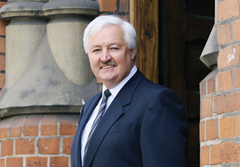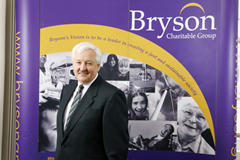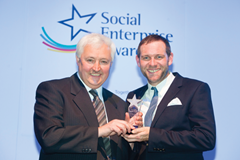Bryson: social paradigm
 Bryson’s Chief Executive, John McMullan, discusses social enterprise with Owen McQuade and points out its potential to change Northern Ireland’s economy and public services.
Bryson’s Chief Executive, John McMullan, discusses social enterprise with Owen McQuade and points out its potential to change Northern Ireland’s economy and public services.
Changing the paradigm of how the Bryson Charitable Group works has brought dividends and enabled it to better serve Northern Ireland’s society, John McMullan contends. Its example, in his view, shows the clear benefits of social enterprise to the province.
Bryson’s Chief Executive sees sustainability as a running thread in the charity’s 105-year history. “It began with not wanting to throw money at issues but understand them and then treat the underlying causes,” he explains. “And I think that stays with the organisation in its modern form. It’s about developing and delivering programmes that create change and deliver tangible outcomes as opposed to just spending money.”
Its original intention was to do “permanent good to the deserving poor” which he finds “quite amusing because one wonders what the undeserving poor looks like.” Until 10 years ago, it was a traditional charity running projects but Bryson fundamentally changed approach to the social enterprise model.
“We took a view that we needed to change the paradigm,” he remarks. “Living in the world of grant aid was quite precarious because it was there or it wasn’t there, and it was subject to a variety of changes or whims.”
Scope
Bryson aims to marry social goals with “a sensitive commerciality” to deliver “social benefit profitably” rather than profit. Its seven business areas, employing 650 people in total, cover some of the major social and economic challenges facing Northern Ireland:
• Bryson Energy;
• Bryson Recycling;
• Bryson Care (in greater Belfast);
• Partnership Care West (around Derry and in Donegal);
• Lagan Watersports;
• Multi-Cultural Resource Centre; and
• North City Training.
Taking Bryson Energy as an example, it addresses two policy issues: reducing fuel poverty and supporting sustainable energy consumption.
“It’s interesting to note that Bryson about 25 years ago was carrying out loft insulation and draught-proofing work in North Belfast with volunteers, trying to prove a need,” McMullan comments. Bryson is now one of two contractors for the Department for Social Development’s £20 million Warm Homes scheme.
When Bryson tendered for the programme, it wanted to show how public spending could maximise its benefits to the Northern Ireland economy, demonstrating the difference between social and private enterprise. As a result, it chose to build a network of small, local installers rather than provide all insulation and heating directly.
This approach benefits both the clients and the local communities where installers work, with people spending more money in local garages, post offices, pubs etc.
Bryson Energy also provided energy saving advice to about 14 per cent of households (100,000) in Northern Ireland last year. The province’s high dependence on imported energy increases the importance of using that energy as efficiently as possible.
Separately, the group directly provides over 200,000 hours of care to vulnerable people across Northern Ireland through Bryson Care and Partnership Care West. Caring for an ageing population will be “critically important as we go forward” so this is an important regional priority.
Bryson Recycling is probably the most visible service, with the large yellow trucks on the roads. It’s a “wonderful piece of work,” he enthuses, pointing out that Bryson processes recyclables from 60 per cent of domestic properties in Northern Ireland.
Recyclables are collected in two ways: the kerbside boxes (which allow for separation at the roadside) or co-mingled in wheelie bins. His preference is for the first system, which provides higher quality materials for recycling, which are more suitable for local re-processors. On domestic recycling, he expects that Northern Ireland can exceed 70 per cent targets.
Of the 52,000 tonnes recovered each year, 34 per cent goes to local companies for re-manufacturing e.g. Huhtamaki, Cherry Polymers and Quinn Glass.
Products include egg boxes, plastic ducting, and bottles for Bushmills and Magners.
“Many other recycling bodies will just simply send materials to the Far East for further sorting,” McMullan comments. “Our focus is on finding local re- processors to maximise the impact of the materials we collect. These materials go back into our local economy and are used in the production of products for both the local and export markets and increase Northern Ireland’s competitiveness”.
Rising unemployment, particularly among young people, is another problem that Bryson aims to tackle. McMullan warns that as a result of intergenerational unemployment some school leavers “don’t have an expectation to be employed.”
 North City Training is a prime contractor for the Department for Employment and Learning’s Steps to Work programme and is a major provider of the Training for Success and Apprenticeship NI programmes and has almost doubled its turnover during the last year. He expects it will soon announce a large contract to increase its delivery to the unemployed in Belfast and adds: “When we tender for these contracts, we are competing with very large national, regional and international players and our bids aren’t found wanting.”
North City Training is a prime contractor for the Department for Employment and Learning’s Steps to Work programme and is a major provider of the Training for Success and Apprenticeship NI programmes and has almost doubled its turnover during the last year. He expects it will soon announce a large contract to increase its delivery to the unemployed in Belfast and adds: “When we tender for these contracts, we are competing with very large national, regional and international players and our bids aren’t found wanting.”
One of Bryson’s lesser known enterprises is Lagan Watersports in Belfast, used by 4,500 young people every year. Its business challenge is “selling a service to young people who can’t afford to use it.” Bryson purchased more property than was needed and sub-let two-thirds of that, to subsidise the cost to users while helping to develop their self-confidence through water sport activities.
Public service contracts give Bryson the stability to grow its business in other ways e.g. tendering for work in Great Britain and the Republic.
Taken together, its businesses are on a growth trajectory with a 24 per cent increase in turnover in the last reported year (2009-2010) and an expected further 20 per cent for 2010-2011. Growth figures for the previous two years were 7 and 14 per cent respectively.
Rebalancing
As the Treasury and the Executive consider how to rebalance Northern Ireland’s economy, he foresees social enterprise as having an important role to play.
McMullan wants people to think outside the traditional duopoly of public sector ‘bad’ and private sector ‘good’.
“Our view is that we to need to hardwire enterprise into the economy, whether that’s third sector or the other two – public and private – sectors, that’s all important for Northern Ireland,” he states. “But we think social enterprise, because it’s driven to provide social value profitably, and is a good way for government to invest.”
On a typical day, Bryson delivers 24,000 services across Northern Ireland. Social enterprise therefore presents a good opportunity if government wants to change how public services are delivered.
Two major challenges for the group stand out to him.
Firstly, on awareness, Bryson has spent a lot of time “trying to build awareness of social enterprise and demonstrate how it can work at scale.” It promotes social enterprise as part of Northern Ireland’s economic fabric which is “driven by excellence”.
Bryson has a turnover of £30 million, and other social enterprises have higher figures, in an economy where 98 per cent of companies have a turnover of under £5 million. The group’s tax and national insurance payments stand at around £2 million per annum.
Secondly, it’s important to give people space to develop in the areas in which they specialise. Building a consensus and sense of purpose across the organisation therefore becomes important.
In pursuit of excellence, the group committed itself to achieving Investors in People accreditation. Each company has been put through the process separately and they now go through as a group “because we hard-wired it into our structure.”
The latest staff survey, completed by 78 per cent of staff, provided “very positive” feedback about staff’s perceptions about working in the organisation. Ninety-four per cent of respondents were satisfied with their job and 96 per cent felt they were trusted.
Staff work well in teams and feel involved in the decision-making process. Customer satisfaction also ran at over 90 per cent.
 Bryson, he emphasises, is not “not looking for a badge” but processes to improve. Each business unit has been charged with finding an appropriate external accreditation, focused on the customer or user.
Bryson, he emphasises, is not “not looking for a badge” but processes to improve. Each business unit has been charged with finding an appropriate external accreditation, focused on the customer or user.
Through the European Foundation for Quality Management (EFQM) model, Bryson analyses where improvements are needed and can be implemented. It came close to winning the foundation’s Northern Ireland Quality Award.
Accreditation assures the commissioner and end-user about the quality of service provided. “We deal with a lot of vulnerable people who are just glad to get any service,” he notes. Commercially, it also helps Bryson stand out in the tendering process.
He’s particularly pleased with one comment from EFQM assessors: “If you could bottle your culture, you could make a fortune.”
Future
Returning to the economic theme, he expects a lot of opportunity to come from the rebalancing process over the next year. The group is also rebranding its organisations so each one carries the Bryson name. However, not all the trends are positive.
“We are experiencing a cold breath of protectionism in some areas,” McMullan relates, “where some public bodies seem more interested in ‘bringing in-house’ rather than looking outside for a more cost-effective solution to their delivery problems.”
Organisations such as Bryson “will and can challenge” that attitude but need to know that government is serious about re-profiling services.
As a sign of its success, McMullan won the UK Social Enterprise Leader of the Year Award on 30 March, an accolade he puts down to “650 great people”. Meanwhile, Newington Credit Union was recognised as the best social enterprise in the UK.
This was the first time that any Northern Ireland entrant had won a UK Social Enterprise Award and he sees it as the shape of things to come: “We do social enterprise better than they do it anywhere else.”
Profile: John McMullan
John holds a BA in business studies and MBA, both from the University of Ulster. He began work in Tyrone Crystal, learning production skills and team- working, before going to Michelin. He spent five years in each post each ending with redundancy and was surprised and pleased to break that cycle by joining Bryson in 1985.
“We actually now own a piece of land in Mallusk where I worked for Michelin,” he notes. John’s personal interests include walking and hill-walking: “I don’t get to do it often enough but I’m in the Belfast hills once or twice a week.” He loves fly-fishing and is a “consummate grandfather and I spend lots of time with little people.”





